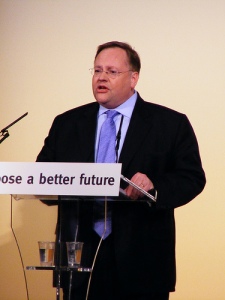The difference between a doctor and an architect is that a doctor gets to bury his mistakes while an architect plants vines.
As leader of the Labour Party, Ed Miliband started out playing the doctor, burying the mistakes of the previous Labour government at his inaugural conference speech. “Wrong because that war was not a last resort, because we did not build sufficient alliances and because we undermined the United Nations.”
There is no doubt that Miliband does represent a break with the past, but what about the future? Labour’s rating has been buoyant in the polls, but Miliband’s rating remains submerged. The electorate’s view of him is detached from their view of the party. They like us, but are unmoved by him. Without a boost to the leader, the party’s poll rating should be considered as illusory. Mr Miliband must therefore up his game.
At least he proved himself in Prime Minister’s Questions. Responding to Cameron’s caricature of him as a student politician, he immediately hit back, reminding Cameron of own student days, “throwing bread rolls and wrecking restaurants”. This should not be underestimated. Mr Cameron is a formidable parliamentary player, but Mr Miliband is more than a match.
So in Parliament, he holds his own, but how about in the media? To me, this is where he has been losing. His weakness is his interventions. For example, when the Prime Minister’s Head of Communications, Andy Coulson, resigned, Miliband’s response was, frankly, boring. He told the television news that Cameron, “made the wrong judgement by hanging onto Andy Coulson because it’s clear that questions need to be answered”.
As a former news editor, I’d say that The TV crew might as well have gone to the local shopping mall and got vox pox from the passers-by, for what that quote was worth.
The entire NoW hacking scandal would have been forgotten about if Cameron hadn’t hired Coulson. Is appointment was the only reason that The Guardian started digging, and rightly so. All it takes is for a civil servant to lose a disc with our personal details, and there is a major scandal, with the government being labelled as “Big Brother”. Cameron hired a man implicated in a bugging scandal, and took him into the heart of government, without ever considering the potential implications.
On the day Coulson left, Ed Miliband had nothing worthwhile to say. The humiliation and incompetence of David Cameron seems to have completely passed him by. When looked at this way, it is little wonder Ed Miliband has so far not made his mark on the British public? So how does he up his game?
When we think about political leaders making interventions, we remember Tony Blair’s response to the death of Diana. We also remember Mr Cameron cementing his leadership credentials in his response to the Parliamentary Expenses affair (although we strongly suspect he had advance warning). We certainly consider the still recent Obama speech, bringing people together following the terrible shooting in Tucson.
However, the far more important interventions are the more regular comments, from the political leader, on the state of the nation, and on the view of the party and the people. In fact, political reputations tend to be built upon a hundred small interventions, but remembered by a single big intervention.
Further to this, a political leader will not strike that cord, or capture the mood of the nation by waiting for it to happen. It will come unexpectedly, but it will only come if the politician is pursuing a course of regular interventions, in the daily business of representing his party’s view.
So is Ed Miliband an architect who plants vines? Will he use his flowery rhetoric as a screen to cover his failings? Will he claim glory for the points scored by the shadow cabinet team behind him, while making intangible points about the “squeezed middle”? Or is he growing into the job incrementally?
Yesterday, in The Independent, Miliband entered into the debate of whether the government’s Big Society policy is a spin on Thatcherism. He made a razor sharp point, cutting to the very heart of Cameron’s leadership and undermining the Tory leader in the eyes of his party. He showed himself as no planter of vines.
Firstly, David Cameron is surrounded by back-benchers who were elected without being on the Cameron-approved A-list of parliamentary candidates. His party members hear his lectures of bottom-up decision making, only to have their prospective candidates imposed on them. He is the Tory leader who was handed the opportunity of majority government and delivered a coalition. He has survived in spite of his arrogant distain of his own party, because he has persuaded the Tories that his detoxification of their brand has made the unelectable, electable.
In The Independent article, Miliband has accused The Big Society policy of causing of “the recontamination of the Tory party.” Through this argument, he demonstrates that the David Cameron’s r’aison d’être is being eroded, by the flagship policy of David Cameron himself. This strikes at the very heart of Cameron’s leadership.
His intervention was not particularly high profile, nor was it glamorous to the world beyond the Westminster village. In itself, it is hardly a manifesto for a future Labour government. It was an intellectual point that brought clarity. It highlighted the failings of the government, while undermining the Prime Minister amongst his own supporters. It was noted by the opinion formers and will affect their output.
We’re yet to see the depth of Mr Miliband’s talent, but yesterday he showed us that he has further to go. His is slowly dressing for the job. It is incremental, and therefore frustrating, but it is fun none the less. We need more of it.




 Posted by Dan McCurry
Posted by Dan McCurry 







